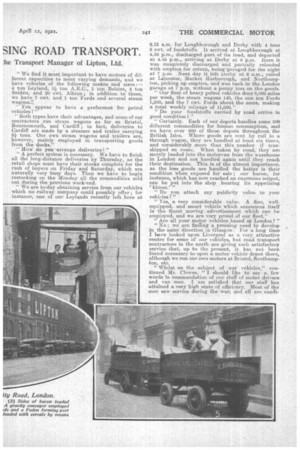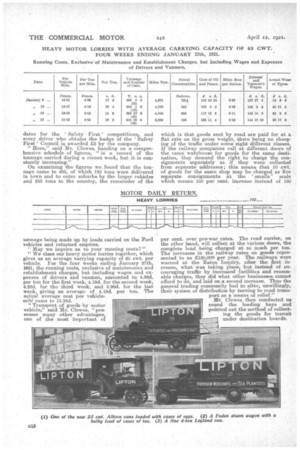SAVING £120,000 A YEA] SING ROAD TRANSPORT.
Page 12

Page 13

Page 14

If you've noticed an error in this article please click here to report it so we can fix it.
An Account of an Interview with Mr. :he Transport Manager of Lipton, Ltd.
“ TIRING the last .15 months we have diverted 20,000 tons of goods per annum from the railways to the roads." This was one of the significant statements made during the course of an interview which we had recently with Mr. J. L. Olewes, the well-known transport manager of Lipton, Ltd., London, the business which, founded and built up by the genius of Sir Thomas Lipton, is now one—to use the company's own familiar slogan" upon which the sun never sets."
Mr. Clewes is an advocate of mechanical road transport, in. spite of the fact that he is primarily a railway man and has had over 20 years' service in the Traffic Department of the Midland Railway' and from 1912 to 1916 was general manager of light railways in England and Ireland. `r How do you account for this great increase in the use of motor vehicles?" we asked.
"Well we obtained our first forced experience of extended deliveries by road during the last railway strike, and when the railways goods rates were increased by 60 per cent, we quickly proved to our own satisfaction that the cost of delivering goods by road to places considerable distances out was cheaper than sending them by rail, quite apart from the saving in the cost of packing and any losses in transit. In order to show that this saving is considerable, take one example, viz., bacon. This is loaded straight from the smoke stoves at the London warehouse into the motorvans without any packing, thus saving fis. 8d. per ton in packing material and labour. On other goods there is also a saving on the carriage of returned empties, as in those instances where cases are used for road transit the goods are satisfactorily carried in containers of cheaper and lighter construction.
' Pilferages, total losses, and damages on the railway have, during recent years, been abnormal ; in fact, ouroldirris in regard to these 'alone have reached 215,000 in a year. We found that when eggs were sent by rail, and, of course, only accepted at 'owner's risk,' large numbers were smashed—for -instance, in one of our shops in Derby, out of six cases of eggs which it received in four weeks, 937 eggs were smashed, and this was at a time when their value was fivepence apiece, being a dead loss of 219 10s. By taking eggs by road we find that none are broken, and the saving in the above instance—if the eggs had been taken by road—would have practically paid the carriage for taking two full loads from London to Derby. Eighteen months ago a 20-mile radius was usual with most firms. That of my company was 12. To-day, Birmingham, Nottingham, Derby, Bristol, and all intermediate places .are servedon regular days by motor lorry. Goods sent to such places as Brighton and Margate are on sale in our shops on the same day that they leave here in fact, they are passing over the counters to customers at 3 o'clock, after having left the London warehouse in the morning."
"What is the actual aaving per ton as compared with railway transport? " we inquired. "On 140 tons delivered to only 27 provincial towns from London the average saving worked out at 9s. per ton in carriage alone, without considering the saving on packing previously mentioned. " e have some 60 motor vehicles in service, and apart from these we employ quite a number of contractors' vehicles, and it may be interesting to you, to know that in no single case do we pay a road transport contractor as much as the railway rates. We are given splendid service in several cases by ex-soldiers who have invested in one or two lorries and become owner-drivers. They all run on the return load system ; for instance, boots are brought up froin Northampton to London and loads of food returned to that town ; hosiery is brought from Leicester and food taken back."
"Of what vehicles does your fleet consist?" we interposed.
" We find it most important to have motors of different capacities to meet varying demands, and we have vehicles of the following makes and sizes :— 4 ton Leyland, 3i ton A.E.C., 3 ton Belsize, 2 ton Selden, and 30 cwt. Albion ; in addition, to these, we have 7 cwt. and 1 ton Fords and several steam Wagons.'e'
" You appear to have a preference for petrol vehicles? "
"Both types have their advantages, and some of our contractors run steam wagons .as far as Bristol, Bournemouth, and Cardiff; in fact, deliveries to Cardiff are made by a steamer and trailer carrying tons. Our own steam wagons and trailers are however, mainly employed in transporting good; from the docks.'
"How do youarrange deliveries?" "A perfect system is necessary. We have to finish all the long-distance deliveries by Thursday, as the retail shops must have their stocks complete for the rush of buyers on Friday and Saturday, which are naturally very busy days. Then we have to begin restocking on the Monday all the commodities sold out during the previous week-end.
"We are to-day obtaining service from our vehicles which no railway company could possibly offer ; for instance, one of our Leylands recently left here at 6.15 a.m. for Loughborough and Derby with 4 tons 5 cwt. of foodstuffs. It arrived at Loughborough at 4.30 p.m., discharged part of its load, and departed at 4.45 p.m., arriving at Derby at 6 p.m. here it was completely discnarged and partially reloaded with empties for return, being 'garaged for the night at. 7 p.m. Next day it left Derby at 6 a.m., called at Leicester, Market Harborough, and Nort'namp-ton, picking up empties, and was back in the London garage at 7 p.m. without a penny loss on the goods.
" Our fleet of heavy petrol vehicles does 8,000 miles per week, the steam wagons 140, the one ton Fords 1,500, and the 7 cwt. Fords about the same, making a total weekly mileage of 11,000." " Do your foodstuffs carried by road arrive in good condition? "
"Certainly. Each of our depots handles some 500 different commodities for human consumption, and we have over 600 of these depots throughout the British Isles. Where goods are sent by rail in a through wagon, they are handled at least six times, and considerably _more than this niunber if transhipped en route. When taken by road; they are merely loaded into the thotorvan from the warehouse in London and not handled again until they reach their destination. This is of the utmost importance, as the less goods are handled the better is their condition when exposed for sale ; our bacon, for instance, which has now reached an enormous output, can be put into the shop bearing its appetising 'bloom.' "
"Do you attach any publicity value to your vehicles?"
"Yes, a very considerable value. A fine, wellequipped, and smart vehicle which announces itself is the finest moving .advertiscment which can be employed, and we are very proud of our fleet," ." Are all your motor vehicles based at London? " " No ; we are finding a pressing need to develop in the same direction in Glasgow. For a long time I have looked upon Liverpool as a very attractive centre for some of our vehicles, but road transport contractors in the north are giving such satisfactory service that, up to the present, it has not been found necessary to open a motor vehicle depot there, although we run our awn motors at Bristol, Southampton, ete.
" Whilst on the subject of our vehicles," continued Mr. Cleaves, " I should like to say a few words in commendation of our staff of motor drivers and van men. I am satisfied that our staff has attained a very high state of efficiency. M-ost of the men saw service during the war, and all are can di dates for the ' Safety First' competition, and every, driver who obtains the badge of the 'Safety First Council is awarded. 25 by the company.
"Here," said Mr. Clewes, handing us a comprehensive schedule of figures, "itt a record of the tonnage carried during a recent week, but it is constantly increasing;" On examining the figures we.found that the tonnage came to 465, of which 156 tons were delivered in town and to outer suburbs by the. larger vehicles and 253 tons to the country, the remainder of the tonnage being made up by loads carried on the Ford vehicles and returned empties. " May we inquire as to your • running oasts?'" "We class our heavy motor lorries together, which gives 119 an average carrying capacity of 03 evit. per vehicle. For the four weeks ending January 27th, 1921, the running costs, exclusive of maintenance and establishment charges, but including wages and expenses of drivers and vanraen, amounted to 4.36d. per ton for the first week, 4.19d. for the second week, 4.22d. for the third week, and 3.96d. for the last week, giving an average of 4.18d. per ton. The actual average cost per vehiclemillJ came to 13.38d.
" Transport of goods by motor vehicle," said Mr. Clews, "possesses many •other advantages, one of the . most important of which is that goods sent by road are paid for at a flat rate on the gross weight, there being no charging of the traffic under some eight different classes. If the railway companies call at different doors of the same warehouse for goods for the same destination, they demand the. right to charge the consignments separately as if they were collected from separate addresses; this means that 10 cwt. of goods for the same shop may be charged as five separate consignments at the ' smalls ' scale which means 150 per cent, increase instead of 100
per cent. over pre-war rates. The road carrier, on the other hand, will collect; at the variou8 doors, the complete load being charged at so much per ton. The increases in the railway rates on goods represented to us £120,000 per year. The railways were warned at the Rates Inquiry, after the first increase, what. was taking. place, but instead of encouraging traffic by increased facilities and reasonable charges, they did what other businesses cannot afford to do, and laid on a second increase. Thus the general trading community had to alter, unwillingly, their system of distribution by turning to road transport as a means of relief."
Mr. Ciewes then conducted us round the, loading bays and, pointed out the method of collect ing the goods for transit under destination boards,
































